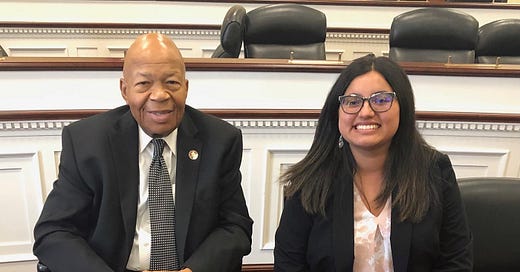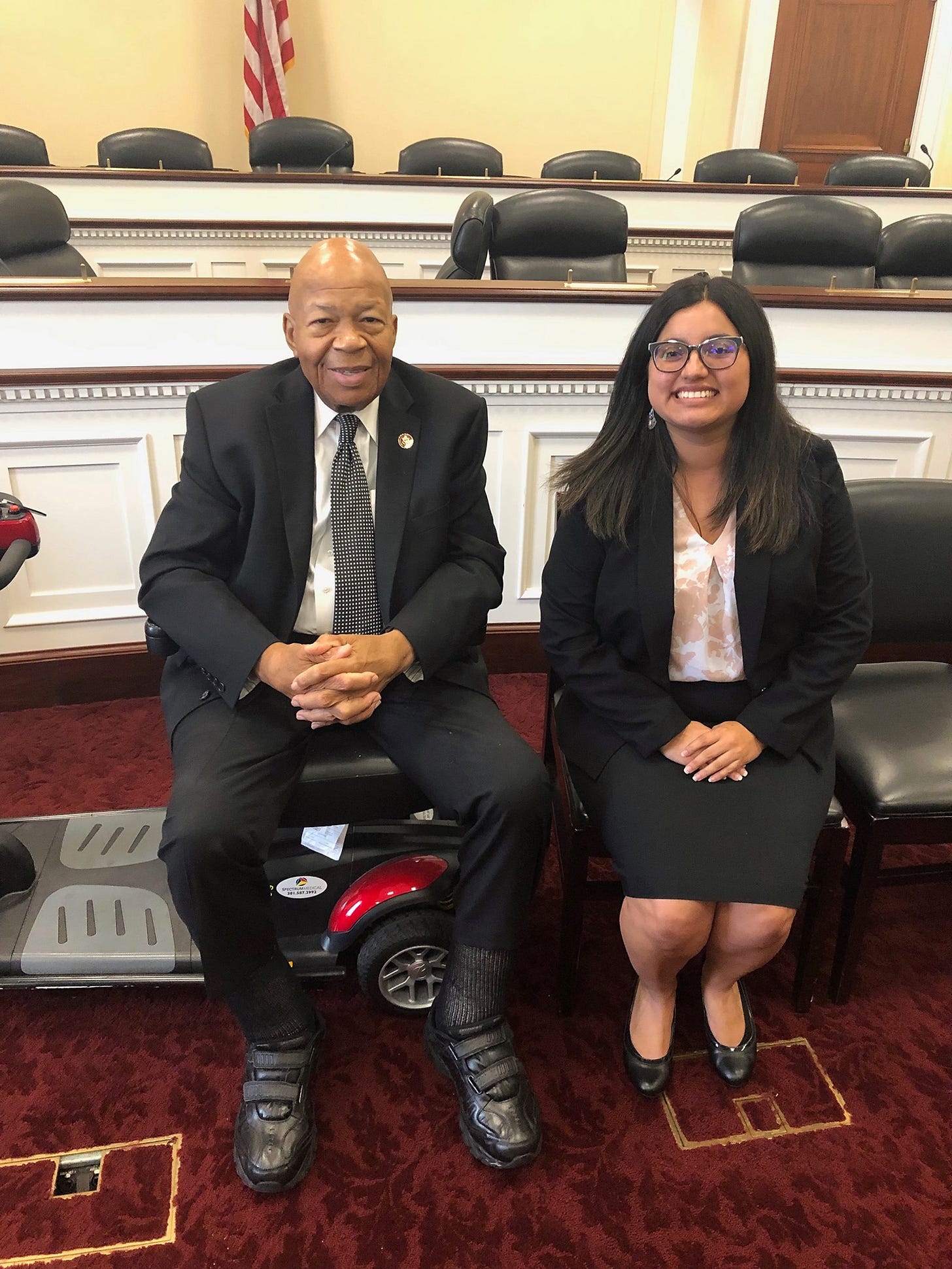In Conversation with Constanza Castro Zúñiga, Part II
"It was the first time that I really got the sense of how important your physical presence is in spaces where your community is underrepresented."
You can learn a lot about Constanza Castro Zúñiga’s work and experiences in the world by browsing her collection of vinyl records and soccer jerseys (at least one of each, if possible, from every country she visits).
“You know, my grandfather would always tell us that soccer is political. Your choice in soccer team says a lot about you as a person,” she tells me. It’s the “people perspective” and the “political perspective,” as she says, which interest her. That and it’s a wonderful way to engage with local communities. It’s part of the reason she made it to four games while on temporary assignment to Mexico for a few weeks.
And it’s the nexus of the political, personal and communal that has guided her during pivotal moments in her career so far. This looks like going to the game, getting to know the fans, listening to the music, patronizing local businesses; and even “at home” in the halls of Congress, being in the rooms where painful truths are shared and bearing witness.
In this second part of our conversation (Part I: Here), we discuss prioritization in foreign policy in relation to Maslow's hierarchy of needs, life-changing guidance from the late Rep. Elijah Cummings and publicly disagreeing with Ambassador Nicholas Burns (and why he appreciated it).
I’m a sucker for any sentence on one’s work that begins, “I know my stuff.” Enjoy.
Part II: Your Work
Tell me about your career trajectory and your method for figuring out your next steps. For example, do you plan or are you guided by intuition or is it some combination — or neither?
We touched on this a little bit when I talked about what I was like when I was younger. Younger me was very goal-oriented and action-oriented: “I’m going to do this thing and here are the seven steps that I need to get there.” And then when the Truman happened [as discussed in Part I] that kind of broke the old mold for me.
I really started ask myself what do I want? What are the things that bring me joy? What are possible career paths that I would enjoy? Then through my wonderful mentor, I was guided and started looking at opportunities that sounded interesting, that made sense. And I just applied for things. Did I get all of them? No, and that's totally okay. There’s always a little bit of luck and timing.
I always tell people that you have to let go a little bit. Younger me would have hated that!
I fundamentally believe you'll end up in the place you're supposed to be when you’re supposed to be there. And so I always remember that if I don’t get an opportunity or an opportunity doesn’t happen, it just means it wasn’t the right time and it was somebody else’s time. And that’s that's okay, right?
I tell people that you have to let go a little bit. I think younger me would have hated that [laughs]. She would have been like, “I need to try to control the process!” An older me is like, “you have to let go and know it’s okay.”
One of the things that I am appreciating and enjoying a little bit now as an entry level officer is that there's not any crazy objective. I can just enjoy being an officer for a little bit, and that's been really great.
I am also exploring my own academic interests. I recently started another master’s and it is such a different feeling now because before it was like here are all the things I'm trying to get done. And this time, I just get to learn and enjoy the process of learning.
Now I’m much less structured. If I feel like something is worth my time, I'm going to do it. And if not, it’s fine. I don’t have to do every single thing that is available. And I can do the things that bring me joy. I’m much more of a follow-your-intuition kind of person now than I was before.
I can just enjoy being an officer for a little bit, and that's been really great.
Tell me about a job or assignment that has lit you up or challenged you or surprised you. Usually it's all three, but what comes to mind?
I would say that for me, the one that comes to mind is my time working on the Hill, and for a myriad of reasons.
I was supposed to go for 10 weeks, and I ended up staying a couple of months longer. It was one of those things that came at the perfect time in the weirdest way. I was coming out of undergrad, and I was burnt out. I had just done four years. I got the [Rangel] fellowship, which I was super excited about but I was expecting to have to apply multiple times. And so I really did not think about how difficult going straight from undergrad to grad was going to be and not taking a break, like not having any sort of break in that process.
So I was super burnt out and having to go on this 10-week assignment to the Hill. They assign you and you get to speak to preferences, but at the end of the day, the offices will kind of divvy up the fellows. I happened to end up in the office of then-Congressman Elijah Cummings, who was chairman of the House Oversight and Reform Committee. And it's one of those serendipitous things where, I don't know, it's like there is one of my guardian angels. But it ended up being the perfect job at the perfect time.
My first two weeks were the worst two weeks of my life. The Hill pace was crazy. I wasn't used to that kind of that environment in that way. I almost — and you could ask my classmates who were with me there at the time — was going to quit. I hate this. I hate it here. I don't want to be here. But then over time, I stuck it out. And it really it turned out to be the best experience of my life.
It's where I really learned how many resources are available to check government agencies. Just to be frank, when there is injustice, how Congress can be a mechanism of justice. And that was really important. But I think what stuck out to me the most was just working with the congressman himself. He was one of those larger than life figures, but he made time for everyone from the lowest intern to his most senior members staff. He knew everyone's names. He knew about our lives and about our families.
That was really powerful because we had a hearing — and this was when we were having a lot of battles about children at the border and children in cages — andwe had a really tough hearing where a mom came in and was talking about her child dying in ICE custody. And this woman did not speak any English, so she was talking to an interpreter.
On the committee at the time, there was one other lawmaker who was Hispanic. And then of the staffers who were there, including myself, I was the only other Hispanic person there. So there were two Hispanic people in that entire room. And hardest thing I've ever had to sit through and listen to, it felt like I was watching my mom give testimony to Congress. It was super painful, but I will never forget what the congressman told me afterward.
I'm sitting in the committee room and I’m sobbing, and [Rep. Cummings] came over to me and he said, “as difficult as I know this was for you, it was so incredibly important that you were there.”
I'm sitting in the committee room and I'm sobbing and I'm very emotional. And he came over to me and he said, “as difficult as I know this was for you, it was so incredibly important that you were there.” And it was the first time that I really got the sense of how important just your physical presence is in spaces where your community is underrepresented.
I took a lot of power from that and just took a lot of power from my time in Congress. But it was probably from an emotional perspective, the toughest work I've done this far.
Can you reflect on a time when you were really in the zone or when you felt like you were at the exact right place at the right time and you were the one to be doing something. What was happening? What does that feel like to you?
That moment for me came in a classroom at Harvard. Obviously at an Ivy League, and Harvard, all of the imposter syndrome that could possibly exist for a person with my background at Harvard is present.
We’re in a class with current-U.S. Ambassador to China, Nicholas Burns. And it's a class on Russia, which I should tell you, is my area of expertise. It's where I've done all my academic study. I know my stuff about Russia. And he brought in the former U.S. ambassador to Russia, John Beyrle. And, you know, in this session, he is really challenging the class and saying, “okay, this is my perspective on NATO's and expansion and, the Russian perspective and here's our perspective.” And he asked, “Does anyone disagree?”
Keep reading with a 7-day free trial
Subscribe to Our Women in the World to keep reading this post and get 7 days of free access to the full post archives.






